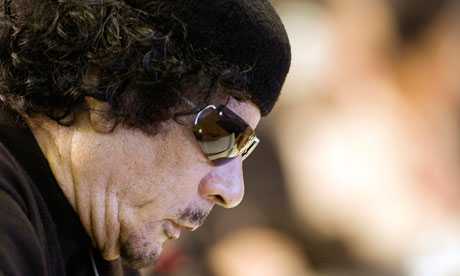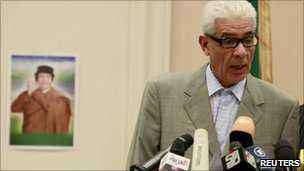Intelligence helped Gaddafi regime track and apprehend dissidents, according to files seized from Tripoli offices
Cherry Wilson

British and US intelligence agencies built up close links with Muammar Gaddafi and handed over detailed information to assist his regime, according to secret files found in Libyan government offices.
The documents claim that MI6 supplied its counterparts in Libya with details on exiled opponents living in the UK, and chart how the CIA abducted several suspected militants before handing them over to Tripoli.
They also contain communications between British and Libyan security officials ahead of Tony Blair’s visit in 2004, and show that British officials helped write a draft speech for Gaddafi when he was being encouraged to give up his weapons programme.
The discovery was made by reporters and members of Human Rights Watch in the private offices of Moussa Koussa, the former foreign minister and head of Libyan intelligence, who defected to Britain in February. He is now believed to be in Qatar.
According to the documents, Libya’s relationship with MI6 and the CIA was especially close between 2002 and 2004, at the height of the war on terror. The papers give details of how No 10 insisted that the 2004 meeting between Blair and Gaddafi took place in his bedouin tent, with a letter from an MI6 official saying: “I don’t know why the English are fascinated by tents. The plain fact is that the journalists would love it.”
They also show how a statement made by Gaddafi during the time in which he pledged to give up his nuclear programme and destroy his stock of chemical and biological weapons was put together with the help of British officials. A covering letter states: “For the sake of clarity, please find attached a tidied-up version of the language we agreed on Tuesday. I wanted to ensure that you had the same script.”
Other letters seem to reveal that British intelligence gave Tripoli details of a Libyan dissident who had been freed from jail in Britain. One US document stated the CIA was in a position to deliver a prisoner into the custody of Libyan authorities.
The papers, which have not been independently verified, also suggest the CIA abducted several suspected militants from 2002 to 2004 who were subsequently handed over to Tripoli. Human Rights Watch has accused the CIA of condoning torture.
“It wasn’t just abducting suspected Islamic militants and handing them over to the Libyan intelligence,” said Peter Bouckaert, director of Human Rights Watch’s emergencies division. “The CIA also sent the questions they wanted Libyan intelligence to ask and, from the files, it’s very clear they were present in some of the interrogations themselves.”
Foreign secretary, William Hague, said he could not comment on security matters. Further documents found at the British ambassador’s residence in Tripoli, and obtained by a Sunday newspaper, concerned the release of Lockerbie bomber Abdelbaset al-Megrahi. A memo written in January 2009 by Robert Dixon, head of the North Africa team at the Foreign Office, and sent to then foreign secretary David Miliband, warned that Gaddafi’s ministers said there would be “dire consequences” for the UK-Libya relationship in the event of Megrahi’s death in custody.
www.guardian.co.uk, 3 September 2011

